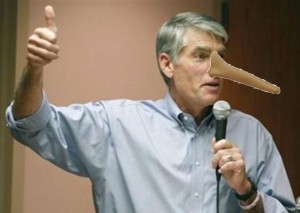
Does Sen. Udall’s self-proclaimed privacy watchdog moniker hold up or is this another contender for Lie of the Year?
The quote below is from The Denver Post’s Chuck Plunkett as he moderated last Tuesday’s Republican Senate candidate debate. Now, many revelations since that night have largely made that debate less relevant, but this quote still is.
“Ken if I can just challenge that just a bit. Since he’s been a Senator, [Udall] has made that a…focus of his, and he’s even said at times that he went as close to committing treason as he could to reveal the contents of what are classified meetings… What could he have done that would have been stronger without a dramatic revelation like a Ed Snowden?” [the Peak emphasis]
We like Chuck, so we want to make sure Chuck doesn’t swallow Senator Mark Udall’s BS line on his NSA record whole.
To do so, we’ll need a little history lesson from another time when classified information needed to become public: the Pentagon Papers.
PeakNation™, if you’re old enough, you may remember the Pentagon Papers, a classified study of America’s role in Vietnam that had the Nixon White House suing The New York Times and The Washington Post from publishing any of the Papers’ contents. Yet, to ensure it got out, former Senator Mike Gravel went to the Senate floor and under protection of the Speech and Debate clause of the Constitution—“for any Speech or Debate in either House, [a Senator or Representative] shall not be questioned in any other Place” – and read the entire Pentagon Papers allowing the Papers to enter public record without any threat of being charged with treason.
This case mirrors Udall’s NSA case so closely, that Gravel himself has even spoken out on it. As it was reported by U.S. News:
Former Democratic Alaska Sen. Mike Gravel thinks lawmakers opposed to the National Security Agency’s phone and Internet surveillance programs should have exposed them long before fugitive whistleblower Edward Snowden provided NSA documents to reporters in June.
Unlike Snowden, who is seeking asylum abroad in lieu of a stiff prison sentence, the senators would have been immune from prosecution because of the Constitution’s Speech or Debate Clause, Gravel told U.S. News.
“Any member of Congress can release any information that they think the public should see,” Gravel said.
…Vague warnings to the public, such as those made by Democratic Sens. Ron Wyden of Oregon and Mark Udall of Colorado were “not good enough,” Gravel said.
“…It’s a clear case of putting your personal ambition above your responsibilities to the people as a leader of the nation.” [the Peak emphasis]
Does that answer your question, Chuck?
